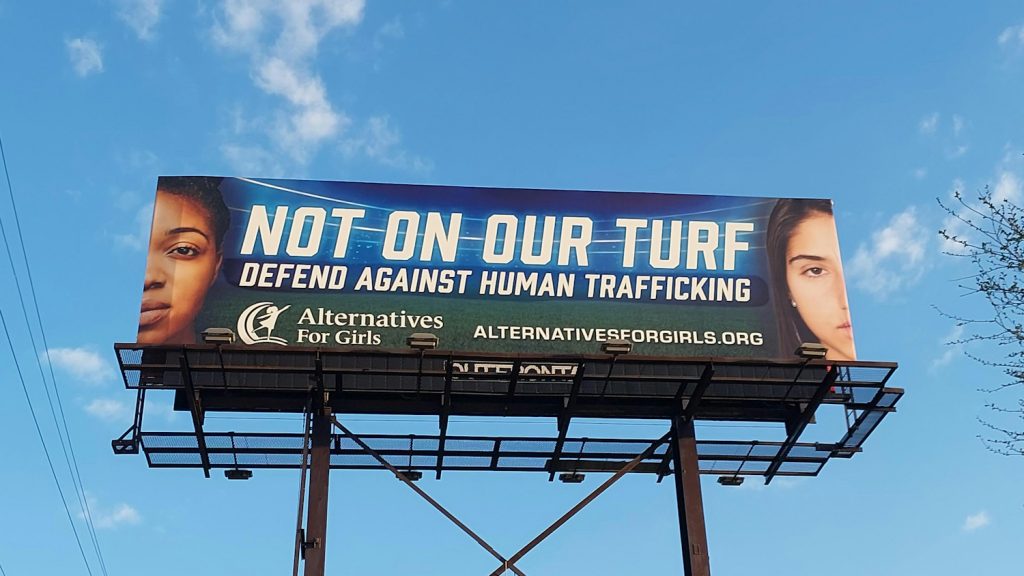Large crowds at NFL Draft could increase risk of human trafficking in Detroit
In metro Detroit, 300 people are being trafficked at any given time — and the number is expected to double during NFL Draft weekend.

A billboard raises human trafficking awareness ahead of the 2024 NFL Draft this week. The billboard, located along I-75 at Vernor Hwy in Detroit, was booked by nonprofit Alternatives For Girls.
With the 2024 NFL Draft coming to Detroit this week, the city is expecting an influx of visitors ranging from football fans to tourists to human traffickers.
When you think about human trafficking, do you see someone in a windowless white van scouring the streets? Do you picture a helpless woman being snatched away into a dark alley? Or maybe it’s a group of girls on vacation getting into an unsuspecting taxi only to be driven somewhere dangerous.
These are the images people often picture when they hear about human trafficking — but they’re examples of the misconceptions Americans have about it.
Human trafficking looks more like coercion. Human traffickers are master manipulators and prey on victims’ existing vulnerabilities.
“That could be physical needs like someone needs a safe place to stay or a meal. Or it can be a less tangible need like love or a sense of family or belonging,” said Megan Cutter, managing director of the National Human Trafficking Hotline. “It’s any situation where someone is forced or compelled to provide sexual services in exchange for something of value like money, drugs or a safe place to stay.”
Listen: Large crowds at NFL Draft could increase risk of human trafficking in Detroit
Dr. Jamie Hope, medical director for the emergency center at Corwell Health Outpatient Campus – Livonia and an expert in human trafficking, says that most victims are coerced through a process called grooming.
It’s a psychological technique where the violator builds trust and a emotional connection with their victim to lower their guard — making it easier to manipulate, exploit or abuse them.
“They reach out to your child and they become their buddy on SnapChat or Fortnite or Instagram,” Hope said.
“They start by saying, ‘Your so cute’ or ‘your so smart.’ ‘Your parents don’t understand you,’ ‘why don’t you send me a picture of your cute smile, oh I’d love to see,’ and it escalates.”
Once violators have that picture, they would use it to blackmail victims into doing sexual favors for them or their clients.
With this kind of manipulation, traffickers don’t need to kidnap anyone. Victims can be trafficked while still living in their homes, going to work or school, and interacting with friends and family.
“Trafficking doesn’t discriminate in any way.” – Chris Szczygiel, FBI Detroit Special Agent
Cutter says traffickers will also try to normalize the abuse and can cause victims to not even realize that it’s happening.
“People will share their experience, but they are not sure if they called the right place,’ Cutter described about the some of the calls the National Human Trafficking Hotline receives.
”People often know they are in an unsafe situation, they know that the person who is exploiting them is doing that, but they don’t necessarily have the words ‘human trafficking’ as the name for their experience.”
In metro Detroit, 300 people are being trafficked at any given time — and the number is expected to rise to 600 during NFL Draft weekend, according to FBI Detroit Special Agent Chris Szczygiel.
“Trafficking doesn’t discriminate in any way,” Szczygiel said. “Through my course of investigating this, I’ve [seen] victims and traffickers of every race, every demographic.”
Szczygiel states human trafficking is not just an inner city problem. The FBI has encountered victims in nearly every suburb in Southeast Michigan.
Signs that someone is being trafficked include:
- Unexplained large amounts of money.
- Change in appearance, like new clothes, hair, nails.
- Inappropriate clothing for the weather.
- Not able to make their own decisions or speak for themselves.
- Avoiding eye contact with others and appearing fearful of the person they’re with.
- Not in control of their own money or documents such as their driver’s license or passport.
- Visible signs of abuse, including bruises, cuts, burns, scars, or lack of health care or proper nourishment.
If you or suspect someone you know is a victim of human trafficking, call the National Human Trafficking Hotline at 1-888-373-7888 or text BEFREE to 233733.
Trusted, accurate, up-to-date.
WDET strives to make our journalism accessible to everyone. As a public media institution, we maintain our journalistic integrity through independent support from readers like you. If you value WDET as your source of news, music and conversation, please make a gift today.
